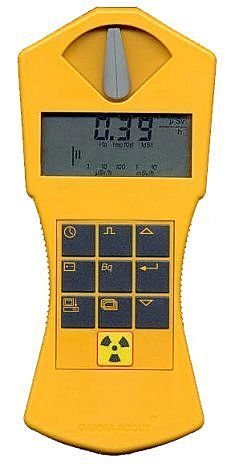There are a number of considerations that should be taken into account when purchasing a Geiger counter. Increased public concerns about radiation exposure, especially since Fukushima, have resulted in an explosion of inexpensive hand-held Geiger counters being brought onto the market. There are many manufacturers and models. If you going to buy a Geiger counter, here is a list of things to watch out for.
Radiation: The counter should be able to measure all three types of ionizing radiation including alpha, beta and gamma. It should have some system of shutters that will allow the unit to measure only gamma, gamma and beta or gamma, beta and alpha.
Measurement units: The counter should be able to measure radiation in both metric and English Units. Metric measurements are in micro-Sieverts per hour or μSv/hr. English measurements are in milli-Roentgens per hour or mR/hr.
Sensitivity and range: The measurement sensitivity of the counter should start well below normal ambient background radiation at around .01 micro-Sieverts per hour and go up to level that can cause cancer at around 1 Sievert per hour.
Measurement Display: The counter should be able to indicate radioactivity both digitally and graphically.
Audio: The counter should have an audio system which will click once for each ionizing particle detected. There should be a switch to turn the audio on or off.
Calibration: The counter should be calibrated against a standard radiation source by a certified testing facility.
Control: The counter should be easy to use with simple controls and clear instructions.
Power supply: The counter should be a low power consumption model. Many counters have built in batteries that last for years which is very convenient.
Maintenance: The counter should be self-contained and not require any user maintenance other than changing the batteries.
Size: The counter should be as small and light as possible to make carrying and using easy. Many of the new inexpensive models are around six inches long by three inches wide by one inch thick.
Durability: The counter should be shock resistant, waterproof, able to withstand extremes of heat and humidity, and be made of a strong material that won't crack if dropped. Most of the inexpensive models are made of plastic.
Data storage: The counter should have a built-in memory that allows it to accumulate readings over a period of time. Memory chips are inexpensive. Some counters can store data for weeks or months.
Connectivity: The counter should have ability to connect to a computer with a standard interface such as a USB port. There should be software provided with the counter to allow analysis of data downloaded to a computer and a cable to provide connection.
FCC-Compliance: The counter should be compliant with FCC-15 standards to ensure it will not interfere with radio transmissions.
When evaluating Geiger counters it is best to go to a source that sells multiple models from multiple manufacturers. Look for comparison charts so you can check how the different models comply with the recommended features listed above.
